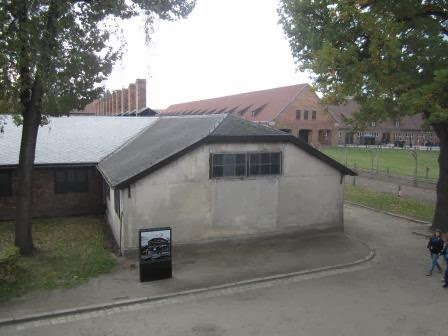 Auschwitz had a wonderful orchestra.
Auschwitz had a wonderful orchestra.
Capo Franz Nierychło was the Capo of the kitchen and he was the Kapellmeister (director) of the Lagerkapelle or camp orchestra. Go figure.
He was a real son of a bitch. He claimed to have been born in Germany, and he obeyed the Germans to the letter. He was a postman before the war, and led the postal orchestra in Łódź Poland. So when he came to Auschwitz the Germans let him organize the orchestra and he picked his guys to play. There were many famous names from all over Europe, Jewish and otherwise.
Where did the instruments come from? I didn’t think people brought their instruments to Auschwitz?
No, no, no. The Germans bought the instruments. The Germans would buy a trombone. Then they looked till they found a trombone player. And so on till they filled the orchestra. Capo Nierychlo would sit with his boys right there just inside the main gates to the camp. The orchestra played lively music like marches as the work crews left for the day. It was supposed to give you energy to work. (Henry gives a very sarcastic smirk.) I specifically remember the Boccaccio operetta – it was a very lively piece (Henry hums a few lines. I was always a little surprised when Henry, whose specialty was sports, would regularly name off favorite Latin phrases, names of operas or quote Goethe poetry. Today we’d refer to him as a true Renaissance man.)
In the evening the orchestra would assemble again and play as prisoners returned to camp from working all day. These poor guys would come back to camp, dragging shovels and bodies. Every day people died, but they had to be counted at the end of the day, so if someone died their fellow prisoners had to drag them back. When you get to camp, you throw the dead on the dead pile by the corner of the kitchen.
When the last dead guy had been carried in, the SS guard would give a sign, and Capo Nierychło stopped the orchestra on whatever note they were on. If you played one note extra he’d hit you in the head or kick you.
The Germans liked their music. On Sunday they held concerts and people would come from as far away as Berlin to hear Nierychło’s orchestra. The SS officers would bring their wives and families too. They’d have picnics and listen to music. Sunday afternoons were quieter in the camps because most of the guards were off on Sunday afternoons.
So I’m confused. Where did the families watch the orchestra; I mean I wouldn’t take my family to a prison camp.
No, they didn’t come to camp. Outside the gates there was about 100 hectares (approx 250 acres) of ground between Birkenau and Auschwitz. Sometimes the orchestra played outside the commandant’s villa for invited guests. They had many things for the officers. There was a farm where they raised pigs, and horses. You were a lucky prisoner if you got to help on the farm outside Auschwitz. Sometimes you could sneak a tomato – but if you got caught you got shot. And on the farm outside the gates there were SS barracks and a movie theater.
Capo Nierychło was no good. But he was nice to me because I am friends with Kazio Szeleste. Kazio was in charge of the pantry, and Nierychło was in charge of the kitchen and the cooks. Kazio was more important since he controlled the food. – Henry Zguda
Photo taken October 2013 at Auschwitz. The view is from a second-story window towards the wall the orchestra sat against to play.The wall is the outside of the kitchen, positioned near the front of the camp. Just out of sight to the right is the arched gate ‘Arbeit Macht Frei’. The chimneys in the background are from the kitchen. While ironic the head of the kitchen is head of the orchestra – he had only to step outside his kitchen to play with his orchestra. If you see the window just left and behind the wall, that was one of the kitchen windows Henry could look out and see the orchestra while he was in the kitchen.
Music of Another World, by Szymon Laks, is the author’s experience as the (Jewish) Kapellmeister in Birkenau. When he tried to get it published in Poland in the 1950’s the (Polish) Ministry of Culture and Art denounced it unfit for publication – the Germans did not look bad enough if they liked music. But it’s an interesting footnote that supports something Henry always said – ‘unless a story glorified the communist liberators’ it didn’t get printed in post-war communist Poland. Eventually published in 1979, the English translation was published in 1989 and is the only memoir I’ve found by an Auschwitz musician.
Primo Levi, in his volume of The Voice of Memory recalled that when he was deported to Auschwitz in 1944 that his arrival at this ‘fearful and unknown world’ was greeted with the camp orchestra playing Rosamunda, a tune Americans will recognize as the Beer Barrel Polka. Levi was Italian so understood no German or Polish or any orders barked at him by guards. However the tune was both recognizable and incomprehensible in such a tragic scenario. In English the chorus goes like “Roll out the barrel, we’ll have a barrel of fun. Roll out the barrel, we’ve got the blues on the run.”
